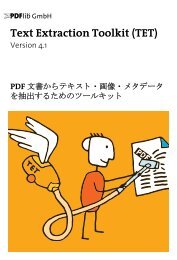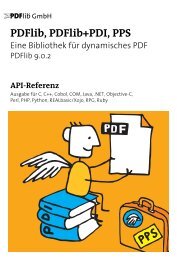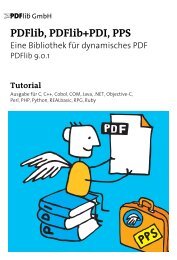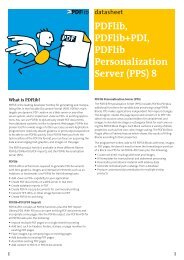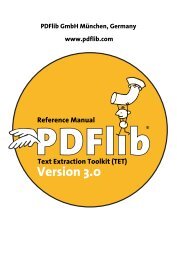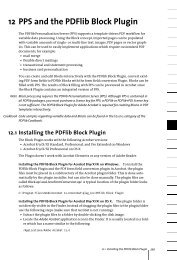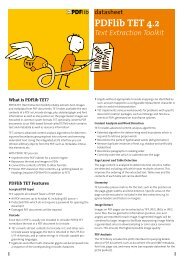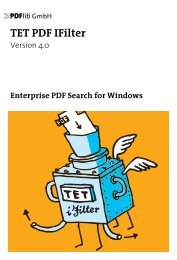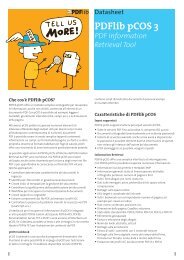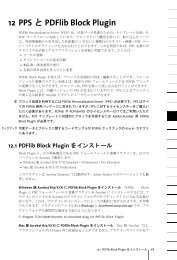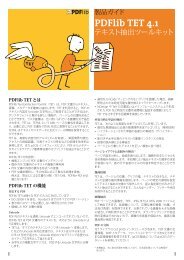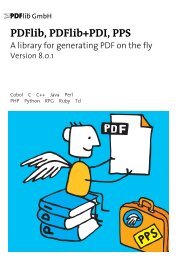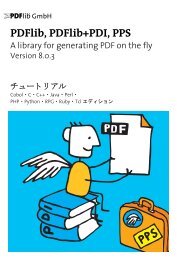PDFlib 8 Windows COM/.NET Tutorial
PDFlib 8 Windows COM/.NET Tutorial
PDFlib 8 Windows COM/.NET Tutorial
You also want an ePaper? Increase the reach of your titles
YUMPU automatically turns print PDFs into web optimized ePapers that Google loves.
8-bit encodings are discussed in detail in Section 4.2, »Single-Byte (8-Bit) Encodings«,<br />
page 101. They can be pulled from various sources:<br />
> A large number of predefined encodings according to Table 4.2. These cover the most<br />
important encodings currently in use on a variety of systems, and in a variety of locales.<br />
> User-defined encodings which can be supplied in an external file or constructed dynamically<br />
at runtime with encoding_set_char( ). These encodings can be based on<br />
glyph names or Unicode values.<br />
> Encodings pulled from the operating system, also known as a system encoding. This<br />
feature is available on <strong>Windows</strong>, IBM iSeries and zSeries.<br />
The disadvantage of single-byte encodings is that only a limited set of characters and<br />
glyphs is available. For this reason complex script shaping and OpenType layout features<br />
are not supported for single-byte encodings.<br />
Builtin encoding. Among other scenarios, you can specify encoding=builtin to use single-byte<br />
codes for non-textual glyphs from symbolic fonts. The format of a font’s internal<br />
encoding depends on the font type:<br />
> TrueType: the encoding is created based on the font’s symbolic cmap, i.e. the (3, 0)<br />
entry in the cmap table.<br />
> OpenType fonts can contain an encoding in the CFF table.<br />
> PostScript Type 1 fonts always contain an encoding.<br />
> For Type 3 fonts the encoding is defined by the first 255 glyphs in the font.<br />
If the font does not contain any builtin encoding font loading fails (e.g. OpenType CJK<br />
fonts). You can use the symbolfont key in info_font( ) . If it returns false, the font is a text<br />
font which can also be loaded with one of the common single-byte encodings. This is<br />
not possible if the symbolfont key returns true. The glyphs in such symbolic fonts can<br />
only be used if you know the corresponding code for each glyph (see Section 5.4.2, »Selecting<br />
an Encoding for symbolic Fonts«, page 129).<br />
The disadvantage of encoding=builtin is that in single-byte encoded text character<br />
references cannot be used.<br />
Multi-byte encodings. This encoding type is supported for CJK fonts, i.e. TrueType and<br />
OpenType CID fonts with Chinese, Japanese, or Korean characters. A variety of encoding<br />
schemes has been developed for use with these scripts, e.g. Shift-JIS and EUC for Japanese,<br />
GB and Big5 for Chinese, and KSC for Korean. Multi-byte encodings are defined by<br />
the Adobe CMaps or <strong>Windows</strong> codepages (see Section 4.3, »Chinese, Japanese, and Korean<br />
Encodings«, page 105).<br />
These traditional encodings are only supported in non-Unicode-aware language<br />
bindings with the exception of Unicode CMaps which are equivalent to encoding=<br />
unicode.<br />
With multi-byte encodings the text will be written to the PDF output exactly as supplied<br />
by the user if the keepnative option is true.<br />
The disadvantage of multi-byte encodings is that <strong>PDFlib</strong> checks the input text only<br />
for valid syntax, but does not check whether a glyph for the supplied text is available in<br />
the font. Also, it is not possible to supply Unicode text since <strong>PDFlib</strong> cannot convert the<br />
Unicode values to the corresponding multi-byte sequences. Finally, character references,<br />
OpenType layout features and complex script shaping cannot be used.<br />
128 Chapter 5: Font Handling (Edition for <strong>COM</strong>, .<strong>NET</strong>, and REALbasic)



